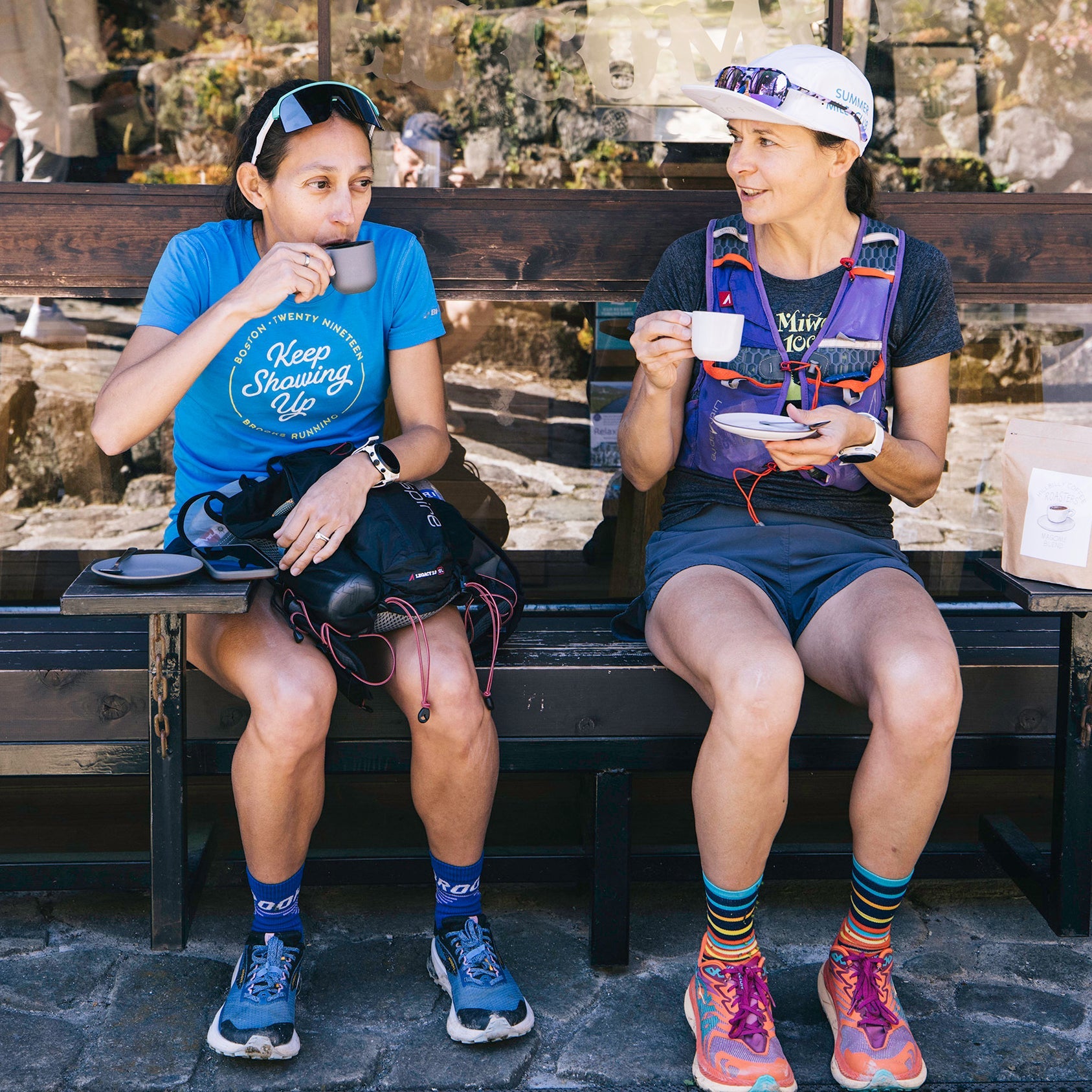Before every race of her historic 18-year career, Des Linden has followed the same ritual. She hand-grinds her favorite beans and makes herself a pour-over, enjoying a cup of coffee an hour before the gun goes off.
“There’s not much I’m particular about, other than the coffee,” said Linden, a two-time U.S. Olympian and 2018 Boston Marathon champion, who first tried the stimulating drink as a teenager and has grown into a bean aficionado, starting her own in 2020. “Traveling the world for running, I went to a lot of coffee shops, trying to stay off my feet before races. So, I read a lot of books and drank a lot of good coffee, and then got curious about the best beans.”
Linden is a firm believer in caffeine consumption mid- and late-race, too. “The mind will tell you that you’re out of fuel, but there’s still a ton left in your muscles. Caffeine helps you find it.”
What works for pros, however, doesn’t always translate to the rest of us. To find out if everyone should drink coffee before racing and if we all should be slurping down caffeinated gels during them, I asked an expert.
Magda Boulet has a master’s degree in exercise physiology, is an Olympic marathoner and ultra-trail running champion, and currently is the president of GU Energy Labs, one of the leading sports nutrition companies in the world. Before her current role, Boulet was the senior vice president of R&D at the lab, overseeing the development of new products for the better part of a decade. In short, she knows a thing or two about training, racing, and optimal nutrition.
“Yes, coffee is a big performance enhancer,” says Boulet, with a grin on her face and a coffee mug visible on our Zoom call. This is true across the board, she says. Caffeine can have a positive performance impact whether you’re male or female, young or old, and if you’re competing in activities ranging from a half hour to a half day or more. Specifically, research shows that caffeine from coffee, gels, and other forms provides an over placebo.
RELATED: Caffeine Can Kickstart Your Workout but Beware Its GI Impact
Numerous Possible Benefits
The benefits of caffeine while exercising include thinking clearly, a lower perceived effort, and less fatigue, thanks to its impact on our central nervous system. Continuing to take caffeine throughout a run—perhaps via caffeinated gels or a cup of flat soda at a trail running aid station—keeps you more alert, which can help you avoid tripping and falling, and to make better decisions, especially on long endurance efforts.
Boulet says that even a low dose (1 to 3 milligrams per kilogram of body weight, or .5 to 1.5 mg per pound) will have a positive effect. In layman’s terms, this means drinking 1-2 cups of coffee (which average 80 to 100 mg per cup) before a distance race. A higher dose of caffeine can help with a finishing kick or a short and intense workout, as long as you don’t overdo it. Excess caffeine—the tipping point differs for each individual—can cause headaches, anxiety, and elevated blood pressure, among other issues.
Besides the amount of caffeine, Boulet says, “The timing is critical, too.” Caffeine takes about an hour to absorb into our bloodstream and has its largest impact during the first four hours. Therefore, Boulet recommends a cup of coffee an hour before a race, followed by steady and smaller doses throughout longer efforts.
During the race is where caffeinated gels, chews, and drinks come in handy, fitting easily in your pocket and designed to be used repeatedly during exercise, with carbs, sodium, and electrolytes baked in. For new runners, Boulet suggests, after starting with 3 mg/kg (1.5 mg/lb) before a run, adding 1-3 mg/kg (.5–1.5 mg/lb) per hour on longer efforts, which translates to one or two typical gels per hour for most runners.
These suggestions, however, will vary for every individual and the length of a workout or race.
“Certain genetic makeups will change how fast you metabolize caffeine, so an hour is just a starting spot,” says Boulet. “You’ll need to test for yourself. Some people will metabolize caffeine faster than others.” That said, the form of caffeine you choose to ingest—coffee, other drinks, gels, or chews—will not have a significant difference on how long it takes to kick in, Boulet says.
RELATED:
Choose What You Use Wisely
To make sure athletes are able to get enough caffeine for optimal performance, Boulet and her team developed the , which has 70 mg, or double what some other gels have but still less than the average cup of coffee. Made with green tea extract, it is less bitter than anhydrous caffeine, a synthetic version that most brands use for gels and chews. When Boulet won ultramarathons—including Western States 100 and Leadville 100— she would aim to take a couple Roctane caffeinated gels per hour, especially in the latter half of the race.
The amount of caffeine in gels and energy shots commonly used by runners varies significantly, from 30mg to 200mg. Knowing how much caffeine you’re ingesting before a run will help you optimize the positive impacts and reduce any drawbacks.
Of course, there are downsides to before or during a workout, too. Common side effects from large doses include dizziness, nausea, and stomach issues, especially on longer and harder efforts, where your body is already drained and trying to manage fatigue, heat, and stress.
Boulet says there is no silver bullet, because caffeine’s impact varies with each individual—some may feel jittery with the same dosage that has little effect on another person. So, just like figuring out how your body handles fueling during a race (either by solid foods or liquid fuels), it’s important to test for yourself by experimenting during training. Like training, shoes, fuel—everything—it takes trial and error to figure out what works best for you.
RELATED:


